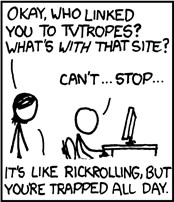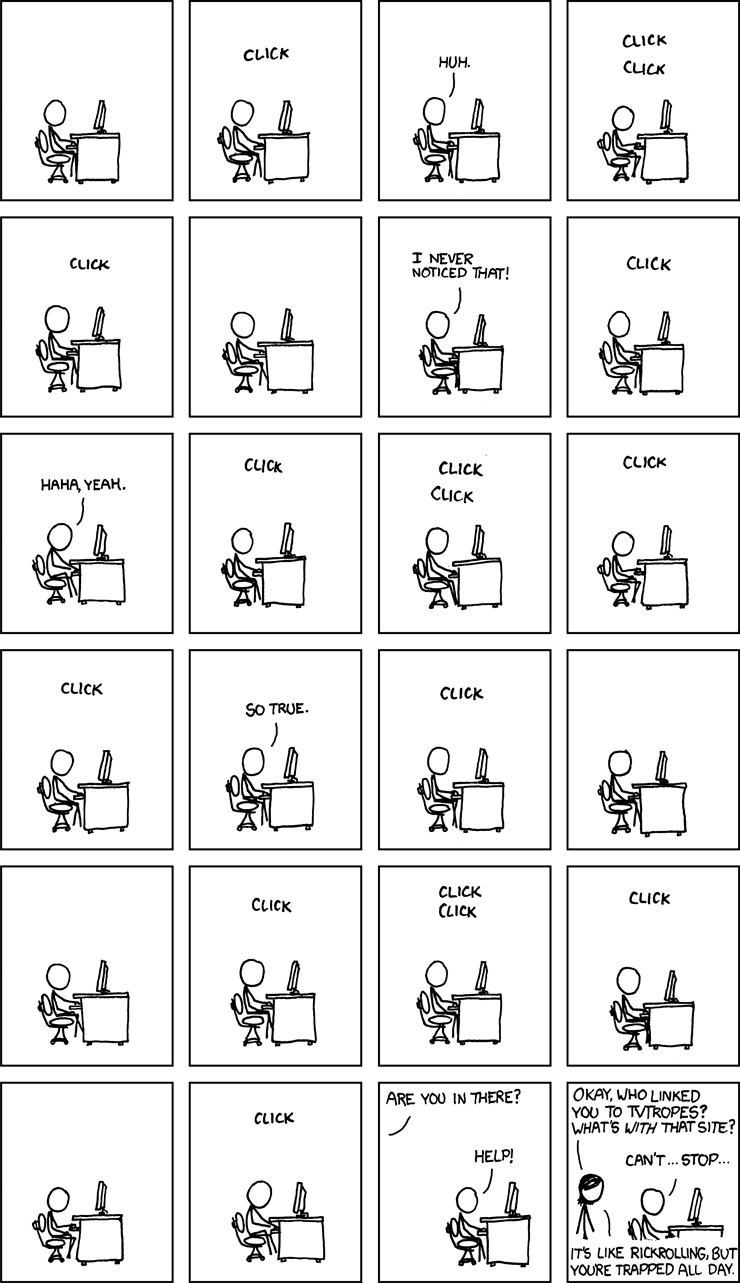
Image Credit:
I tend to be one of those lit instructors who rarely brings up the dreaded "literary devices" in the classroom. Too often, handing out a list of tropes and techniques and asking students to recognize them in a text becomes a labelling exercise that does nothing to further the student's engagement with the work.
The wiki TV Tropes has begun to change my mind. A little bit. For those who are unfamiliar with the project (beware, you can while away many an otherwise productive hour on this site), TV Tropes is a wiki that crowdsources definitions and examples of various techniques used in various narrative media: manga, graphic novels, television shows, video games, films, and yes, "classic" literature. The editors describe the tone of the site as "breezy" and "informal," which often makes the entries as entertaining as they are informative. TV Tropes gets referenced frequently in fan communities and on media criticism websites.
What I like about this site is that it encourages both readers and writers to use narrative techniques (many if not most of which have appeared in Intro to Literature textbooks for ages) as a way of engaging with the text and the medium. As the post "TV Tropes Will Ruin Your Life" says,
Analyzing a medium in depth and pulling it apart by the seams teaches you to watch things critically--analyzing every aspect and codifying them inside your mind.
Most tropers, academics, directors or writers who so this start to find new ways to enjoy media. The subtle blends of plots, the new spins on old stories. The rare and welcome times where a plot you weren't expecting appears. But it is never the same.
Enjoyment comes from a balance of Recognition and Surprise--we enjoy things that we can relate to and have seen before, but we also like to be surprised. Total recognition is cliche; total surprise is aleinating. Through comparing different works of fiction, browing TV Tropes will merge surprise almost entirely with recognition and you will begin analyzing everything and taking a totally new (and possibly better) enjoyment from media--or reality.
It's difficult to think of a better mission statement for an E314 literature classroom. Rather than labelling devices, learning about narrative techniques and tropes can be a way of encouraging students to think about the expectations they bring to a narrative and how those expectations are shaped by narratives they have already encountered.
The assignment I suggested in this semester's Lesson Plan attempts to use TV Tropes as a way of getting students to connect tropes to their experience with a particular narrative. This could work as a simple journaling exercise or even as a formal essay. Really ambitious instructors might have their students create their own wiki pages describing the tropes used in a particular work and linking them to other works that use those tropes in similar ways.
My interest in discussing tropes and techniques across media began with a student's essay on Dante's Inferno the video game, which is, of course, adapted from the poem, which we read part of in class. This led to a discussion about the ways in which Inferno translates nicely into a video game. Namely, it has a series of defineable "levels" (the circles of Hell) that become progressively more intense until you get to the Big Bad himself, Lucifer. However, a journey through Hell that consists mostly of talking to people and learning stuff about God and the nature of the cosmos isn't actually riveting content for a gamer to conquer, so naturally the game creators translated these levels into boss encounters and reimagined the narrative frame as a hero's quest. Dante is a veteran warrior (maybe sort of true, considering his family's involvement in the Guelph and Ghibeline conflict) and his beloved, Beatrice, is spirited away to Hell by Lucifer, who is much more like a Balrog than like the frozen, crying guy we see trapped at the center of the world in the poem. So, we also talked about how these changes are meeting the narrative demands of video games and meeting the expectations of the gamers.
The lesson plan I contributed this semester takes that conversation and translates it into a formalized activity that could be used for something as simple as a journal exercise or as elaborate as a formal essay or class wiki project. Students should take some time in class to famliarize themselves with TV Tropes and then take a short narrative work home to read. Instructors might provide a list of central tropes they might want their students to focus on but encourage them to explore on their own. Students should then begin identifying tropes within the assignment, connect those tropes to other works (either other class assignments or other narratives that come to mind) and write about how the author's specific use of that trope shapes their experience as a reader.
Some instructors may still find this to be too much like a labelling exercise, but done correctly, I think it has enormous potential to get students to engage with texts on a different level and begin thinking about the works they encounter in literature classes not as self-contained "classics" that have little to do with them or their lives but as texts that are embedded in a set of narrative conventions and expectations that have developed over the course of several millenia.
comic from XKCD


